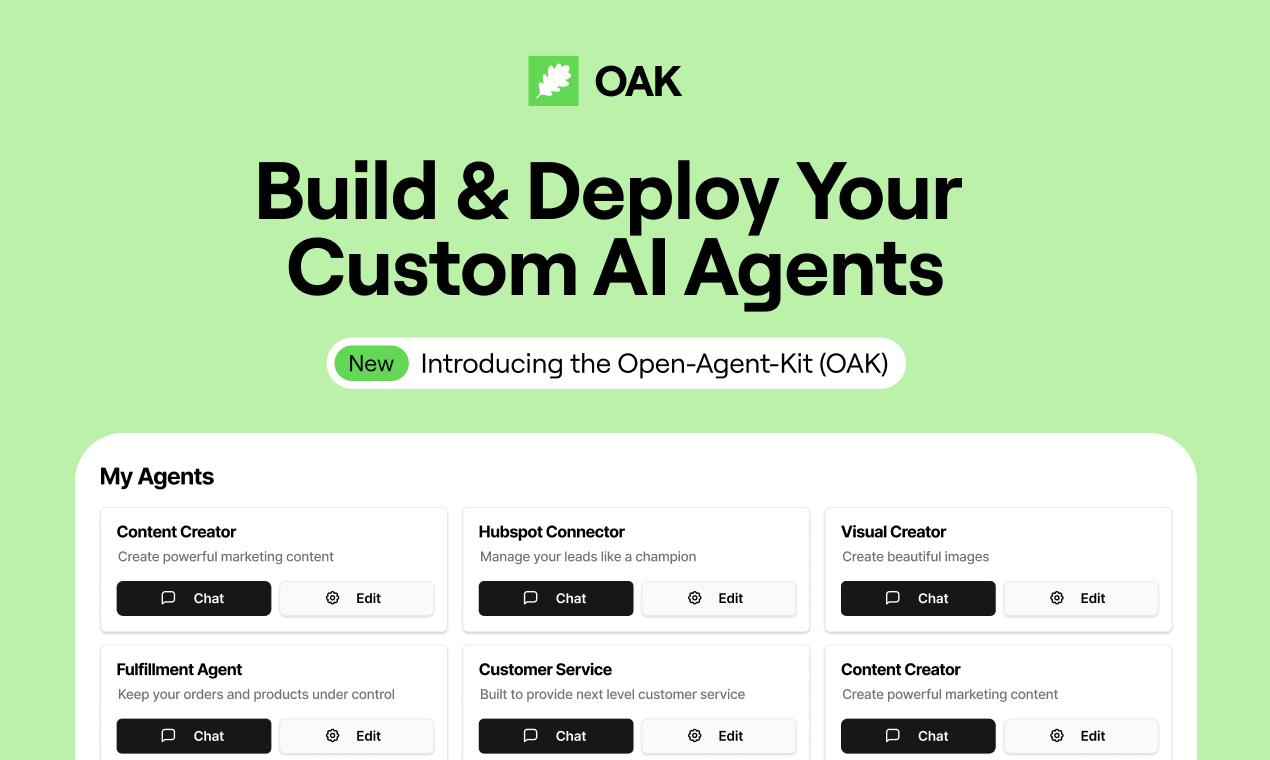
Table of Contents
Overview
In the rapidly evolving world of artificial intelligence, building and deploying AI agents can feel like navigating a complex maze. Enter Open Agent Kit (OAK), a developer-centric, open-source framework designed to simplify this process. OAK empowers developers to create and deploy AI agents with unprecedented flexibility, speed, and scalability. Let’s dive into what makes OAK a powerful tool for building the next generation of AI-powered applications.
Key Features
OAK boasts a robust set of features that make it a compelling choice for developers looking to build custom AI agents. Here’s a closer look:
- Open-source platform: OAK’s open-source nature fosters community collaboration, transparency, and allows for complete customization.
- LLM agnostic: Seamlessly integrate with any large language model (LLM), giving you the freedom to choose the best model for your specific needs.
- Plugin extensibility: Extend the capabilities of your AI agents with a wide range of plugins, tailoring them to specific tasks and domains.
- Workflow embedding: Easily embed AI agents into existing applications and operational workflows, streamlining processes and enhancing productivity.
- Developer-first design: OAK is built with developers in mind, offering a user-friendly experience and comprehensive documentation.
How It Works
OAK streamlines the process of building and deploying AI agents. Developers begin by connecting OAK to their preferred LLM, leveraging its power for natural language understanding and generation. Next, they can extend the agent’s capabilities by incorporating plugins, which provide specialized functionalities. This modular approach allows for the rapid setup of AI agents that seamlessly integrate into existing applications or operational workflows. The result is a flexible and scalable system that empowers developers to quickly bring their AI ideas to life.
Use Cases
OAK’s versatility makes it suitable for a wide range of applications. Here are some key use cases:
- Rapid AI agent prototyping: Quickly iterate and test new AI agent concepts, accelerating the development process.
- Embedding AI in apps: Integrate AI agents into existing applications to enhance user experience and automate tasks.
- Custom enterprise automation: Automate complex business processes with tailored AI agents, improving efficiency and reducing costs.
- LLM experimentation: Explore the capabilities of different LLMs and fine-tune their performance for specific applications.
Pros & Cons
Like any tool, OAK has its strengths and weaknesses. Understanding these can help you determine if it’s the right choice for your project.
Advantages
- Highly flexible: OAK’s modular design and LLM agnostic approach provide unparalleled flexibility in building custom AI agents.
- Open-source community: Benefit from the collective knowledge and contributions of a vibrant open-source community.
- Fast to deploy: OAK’s streamlined workflow enables rapid deployment of AI agents, reducing time to market.
Disadvantages
- Requires technical expertise: OAK is designed for developers and requires a certain level of technical proficiency.
- Plugin support maturity varies: The maturity and availability of plugins may vary depending on the specific functionality you need.
How Does It Compare?
When considering AI agent frameworks, it’s essential to understand how OAK stacks up against its competitors.
- LangChain: Similar to OAK, LangChain takes a developer-first approach. However, LangChain boasts a broader ecosystem of integrations and tools.
- Autogen: Autogen offers a more opinionated approach to AI agent development, providing less customization options compared to OAK.
Final Thoughts
Open Agent Kit (OAK) is a powerful and flexible framework for developers looking to build and deploy custom AI agents. Its open-source nature, LLM agnostic design, and plugin extensibility make it a compelling choice for a wide range of applications. While it requires technical expertise and plugin support may vary, OAK offers a fast and scalable solution for bringing your AI ideas to life.

